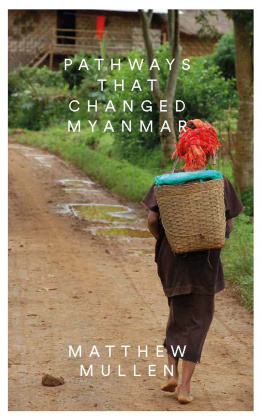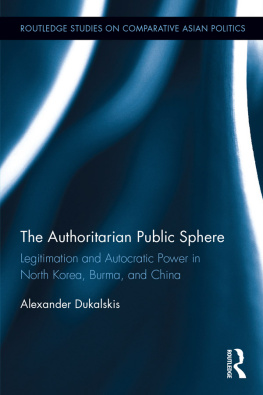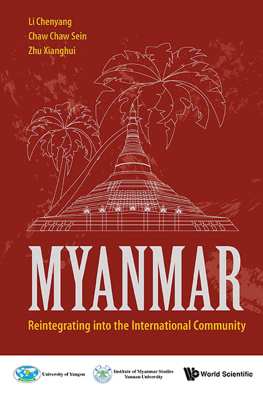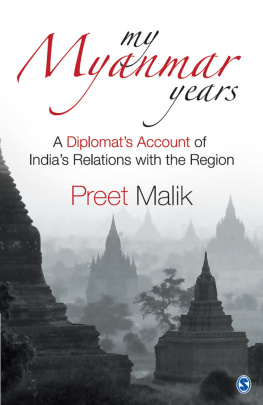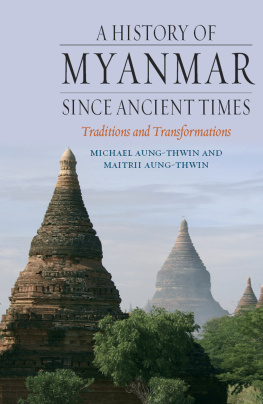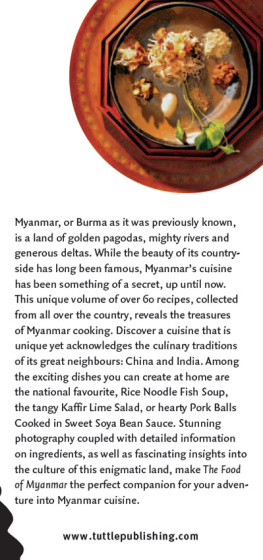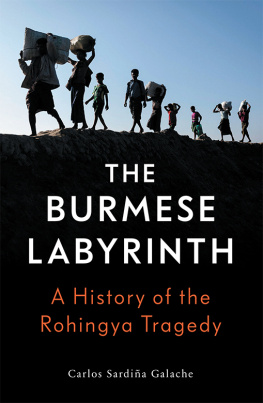about the author
Matthew Mullen lectures at the Institute of Human Rights and Peace Studies, Mahidol University, Thailand. He has written widely on the politics of Myanmar, as well as on oppression and resistance, transitional justice, structural and cultural violence, and business and human rights.
PATHWAYS THAT CHANGED MYANMAR
MATTHEW MULLEN
Pathways that Changed Myanmar was first published in 2016 by Zed Books Ltd, The Foundry, Oval Way, London SE RR, UK.
www.zedbooks.net
Copyright Matthew Mullen 2016
The right of Matthew Mullen to be identified as the author of this work has been asserted by him in accordance with the Copyright, Designs and Patents Act, 1988.
Typeset in Bulmer by Swales and Willis Ltd, Exeter, Devon
Index by Ed Emery
Cover design by kikamiller.com
Cover photo by Matthew Mullen
All rights reserved. No part of this publication may be reproduced, stored in a retrieval system or transmitted in any form or by any means, electronic, mechanical, photocopying or otherwise, without the prior permission of Zed Books Ltd.
A catalogue record for this book is available from the British Library.
ISBN -- 78360 -- hb
ISBN -- 78360 -- pb
ISBN -- 78360 -- pdf
ISBN -- 78360 -- epub
ISBN -- 78360 -- mobi
Contents
Sadly, the people who deserve the most thanks and acknowledgement, those who welcomed me into their homes and communities, guided me, and shared their perspective cannot be credited by name. This book is the product of their personal insights. The research also benefited greatly from the feedback offered by experts. These experts provided both advice and candid perspectives. I would like to offer a special thanks to those individuals who dedicated a significant amount of time and feedback during the research, including Voravit Suwanvanichkij, Mael Raynaud, Aung Naing Oo, Elliott Prasse-Freeman, Hla Hla Win, Sunny Snowden, Ya Tu, Yan Min Aung, and Brian Wadman.
I would like to thank the entire academic and administrative staff at the Institute of Human Rights and Peace Studies, Mahidol University. Im particularly indebted to Dr Mike Hayes and Dr Sriprapha Petcharamesree, who provided years of guidance.
Thanks to Kim Macquarrie and Ciara Byrne for both insights and writing support sessions. Professor James Scott provided an insightful review of the research, for which I am very thankful. Many thanks to those who provided invaluable chapter comments: Elliott Prasse-Freeman, Ya Tu, Mael Raynaud, Nwet Khaykhine, Brian Wadman and Dr Mike Hayes.
The transition-specific research was made possible by Mentors, a foundation dedicated to assisting people through transitions to self-sufficiency. Mentors funded a research project designed and coordinated by Ya Tu with the assistance of Elliott Prasse-Freeman and myself. Without Mentors support, this research would have been incomplete, as it was Mentors funding and flexibility that made gathering field accounts of transitioning Myanmar possible.
A special thank you to my wife, Brooke, for being a constant source of inspiration, love, and sanity.
As non-state armed groups prepared to defend their land and ways of life, community organizers sat with soldiers to broker permission for new projects. While leaders of global Free Burma Campaigns lobbied in foreign capitals for sanctions and shaming, a network known as the Third Force chose to engage the regime and sought ways to mobilize opportunities for community organizers. In Thailand and around the world, migrant workers from Myanmar weathered uncertain migration to undertake strenuous, high-risk, low-paying jobs. Their remittances created opportunities and changes never before possible. All the while, in every corner of the country, communities constantly navigated, resisted and reconstructed the situation around them. These individuals neither set out abroad nor stood up and spoke out. Theirs was a hidden, subtle, often messy struggle. Pathways to change in and around military-ruled Myanmar crossed, meshed, clashed and diverged. It was a milieu where the worst and best of humanity were on display.
The oppression and brutality of military governance was palpable, seen in the regimes threatening propaganda found throughout the cities, the predatory presence of security forces surveying everyday interactions and the absence of functional public services and welfare systems. Formal powers and writes habeas corpus in Myanmar ultimately could have detrimental rather than benefi cial effects on a society that is already profoundly demoralized.
Dually notable were the grit, creativity and innovation that lent to self-protection and systems of resiliency. Unwritten protocol around the corruptibility of local officials (November 2015 , as the National League for Democracy (NLD) won a sweeping majority of parliamentary seats in Myanmar.
One can only guess at who or what ultimately brought Myanmar into a transition. The change agency of a migrant worker who worked, saved and sent money back to Myanmar, for instance, may only be comprehensible in the communities to which his or her remittances flowed. Absent any mass uprising or trigger, changes in military-ruled Myanmar culminated over a period of time: a reformed 2008 Constitution; a November 2010 general election (the first since 1990 ); the November 2010 release of Nobel Peace Prize winner from house arrest; the dissolution of the State Peace and Development Council (SPDC), the junta, in March 2011 ; an August 2011 commitment to nationwide ceasefires; the gradual release of political prisoners and freeing of expression; the April 2012 by-elections when the NLD including Aung San Suu Kyi won seats in Naypyidaw; the NLD victory in the 2015 election; then in early December 2015 , NLD leader Aung San Suu Kyi had a meeting that would have been unthinkable just years before with the man who had held her under house arrest for years, the former head of the military junta, Than Shwe. This was enough to motivate a gradual lifting of international sanctions and new waves of international praise and investment.
Myanmars transition has, thus far, cut many ways. For some, the transition has been a period of uncertainty and feelings of new and expanding vulnerability. Waves of anti-Muslim violence spread throughout the country. The targeting of the Rohingya, a particular Muslim group living mostly in Western Rhakine State, may amount to acts of genocide. Mild inflation has outpaced wage increases, leaving people struggling to survive. Invigorating a state capable of protecting the rule of law, delivering public services and ensuring welfare would require fundamentally overhauling the machinery of a military-state with hybrid-imperial structures, characterized by high despotic but low infrastructural modes of power, and fueled by rent-extraction (Prasse-Freeman 2012 : ). Such transitions are always uncertain and imperfect. As much international money and attention flowed to Naypyidaw to fix governance problems, there were concerns that such support could be contributing to aggressions, dislocations and other injustices resulting from authoritarian development agendas. Thus far, from below, the transition appears to be a tale of both new opportunities and new vulnerabilities:
Informant perceptions suggest that vulnerability has defused from emanating from one primary source (the military-state) to being experienced as tied up in a number of different institutions (the market, the law, society itself in the cases of those who are different). In this diffusion, there is evident a thickening and expansion of the subjective experiences of vulnerability. Indeed, the many institutions that are the vehicles of the transition insinuate opportunity (through the idioms of development, rights, formalization, democracy, the rule of law, and progress), while simultaneously introducing vulnerabilities as well. ()

